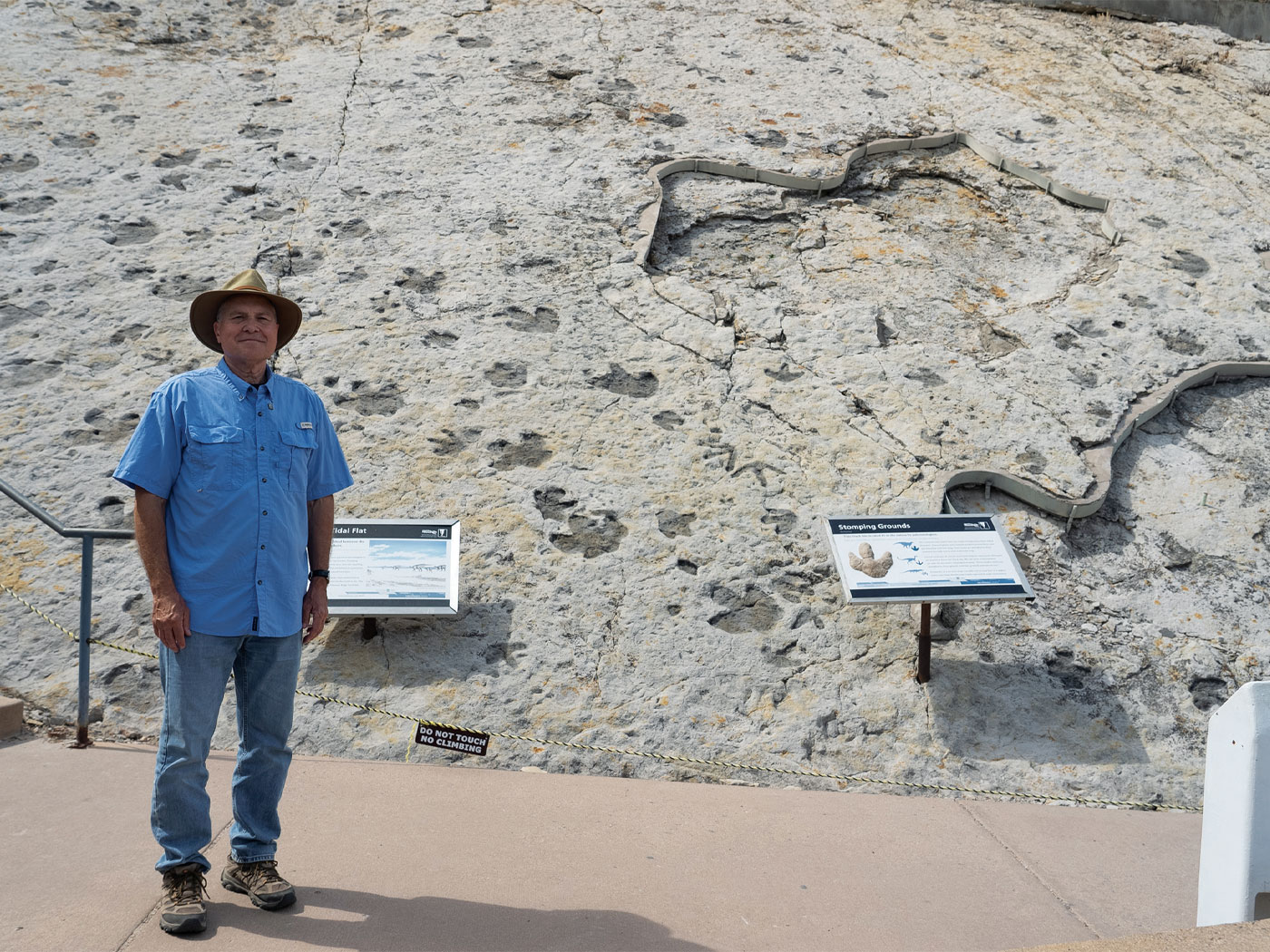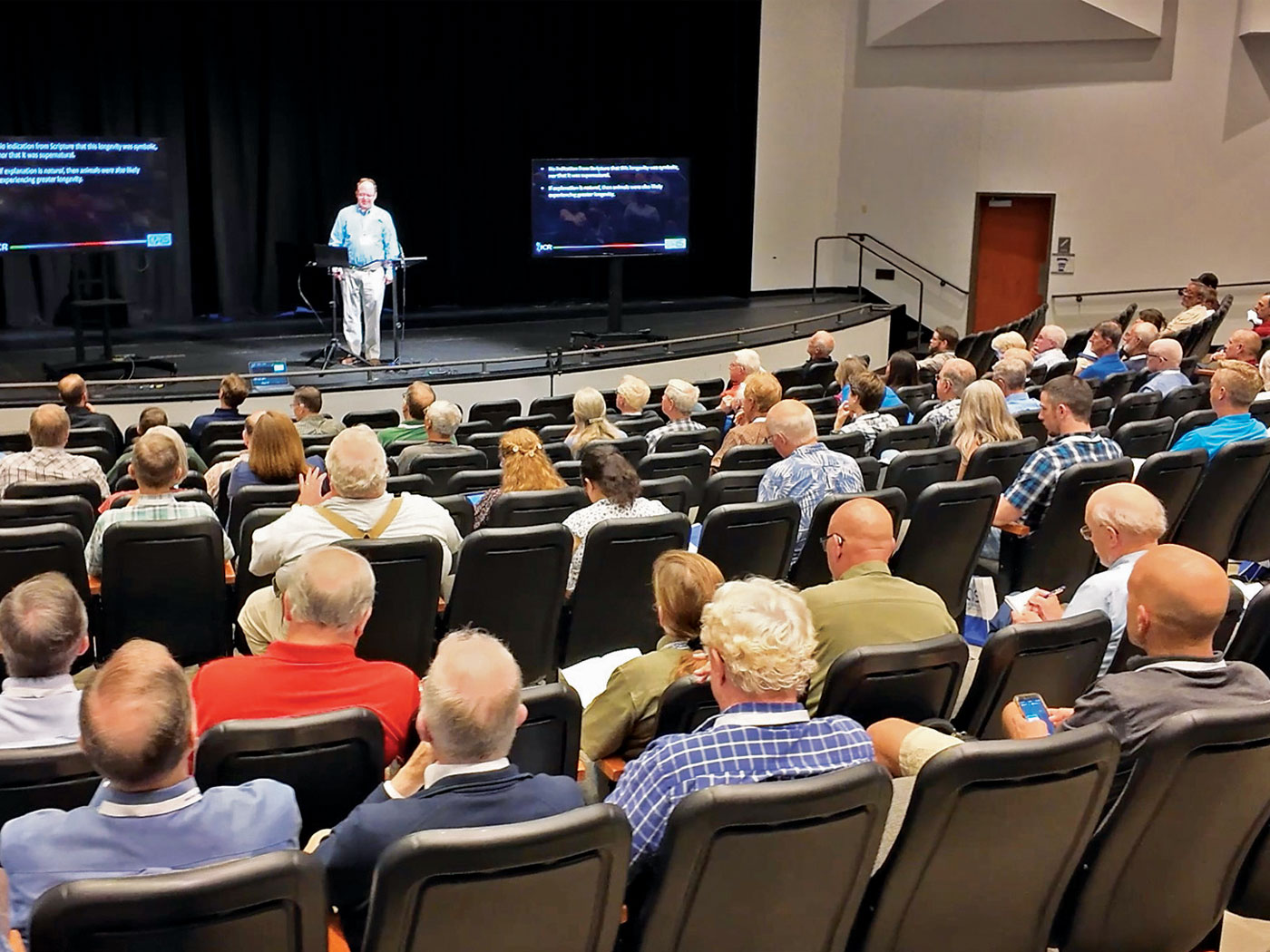Acceptance of old-earth ideas, including the Big Bang, progressive creation, theistic evolution, the framework hypothesis, etc., necessarily implies downgrading the Flood of Noah's day from worldwide in scope to merely one of local extent. For example, Dr. Hugh Ross (an aggressive advocate of billions of years for the earth's age) vigorously denies the global flood. He calls it "universal," covering all that Noah could see, but not the entire earth. This insistence does not come from sound Biblical exegesis, but from the incompatibility of a global flood with old-earth thinking, which he accepts. The evidence for great ages is thought to be found in the rock and fossil records of the earth's crust. These are interpreted by the principle of uniformitarianism, that "the present is the key to the past." Since geologic processes happen slowly today, they argue, the extensive rock and fossil records must have taken great lengths of time to form.
However, a flood of the proportions described in Genesis would have resulted in vast amounts of erosion and redepositing of sediments, fossilization of plants and animals, volcanism, and redistribution of radioisotopes. If one denies the global flood as a historic event, he might use the Grand Canyon/Colorado River system to "prove" great ages, when, in reality, the Canyon demonstrates flooding processes with rates, scales, and intensities eclipsing anything observed today. Thus the misunderstood evidence of old ages, is actually strong evidence for the Flood. In reality, the global flood and recent creation doctrines are synonymous concepts, forcing Dr. Ross and others to twist Scripture, making it say something it clearly does not. To document that the Bible specifically teaches the global flood should be sufficient to convince a true believer in the authority of the Bible.
Biblical Arguments for a Global Flood
Keep in mind that local flood/old earth advocates postulate the earth before the flood as essentially identical to today's earth.
-
The depth and duration of the Flood. The flood waters covered the mountains to a depth of at least the draft of Noah's Ark (Genesis 7:19,20). Today's mountains in the Ararat region include Mount Ararat which rises to 17,000 feet in elevation. The flood lasted for a year, peaking 150 days after it started (7:11, 8:3,4), then it began to abate. A year-long mountain-covering flood is not a local flood.
-
The Physical Causes for the Flood. The Bible explains that the breaking open of "all the fountains of the great deep" and the "windows of heaven" (7:11) were the primary causes. The "deep" is the ocean; thus the "great deep" could hardly be the cause of a limited local flood. The "windows" seem to refer to the "waters above the (atmospheric) firmament" (1:7). These were global causes, producing a global effect.
-
The Need for an Ark. Noah was given many years of warning, long enough to walk anywhere on earth. The animals also would have lived globally and so could have migrated anywhere. There was no need for an Ark if the flood was local.
The Ark's size, big enough to carry two (or seven for some) of each land-dwelling, air-breathing animal, testifies for a global flood. Building such a huge ship for a local flood for which there was ample warning would be ludicrous.
-
Destruction of All Mankind. The flood's primary purpose was to destroy sinful mankind. While the earth's preflood population is not given, reasonable assumptions based on Biblical data for average family size, life spans, and age of parent at time of first-born yield a population far in excess of the maximum mesopotamian population. The earth was "filled with violence" (6:11-13), and while this may have included animal violence, it certainly included human violence. An earth filled with violence would necessitate an earth filled with people. Only a global flood to accomplish its primary purpose.
Not only were violent inhabitants under condemnation, the earth itself was to be destroyed (6:13). The word for "earth" was the same word as used in the creation account (1:1). Surely it means the planet, not just a local area.
-
Promise of No More Floods. At the end of the flood, God promised that there would never again be such a flood (9:15). But there have been many floods, even regional floods, especially in mesopotamia, since Noah's day. If this was merely a local flood, then God broke His promise, and the rainbow covenant means nothing.
-
The Testimony of Jesus Christ. Christ compared the days immediately prior to His second coming to the days prior to the flood. He reminded us that "the flood came and destroyed them all" (Luke 17:27). The coming judgment will be similarly extensive. If the flood in Noah's day was local, people living outside the area survived, even though they, too, were sinners. This gives great hope to end-time sinners. Will they be able to escape the coming fiery judgment on sin?
-
The Testimony of Peter. Peter also wrote of the coming judgment of the entire heavens and earth (II Peter 3:10-12). He based his argument on the historical facts that the creation was of the entire earth (v.5) and that the flood overflowed the entire earth (v.6), causing it to perish. If the flood was only local, does this imply that only a portion of the earth will "melt with fervent heat" (v.10)?
Furthermore, the entire creation will be fully renewed, replaced by "a new heavens and a new earth" (v.13). The local flood idea produces theological nonsense.
- Many Expressions of the Flood's Global Nature. Hugh Ross rightly claims that the word "all" can sometimes be used in a limited sense (e.g., Genesis 41:57); thus the terms used in the flood account might be similarly limited. But proper Biblical exegesis involves discerning the meaning of words in their immediate context. A passage cannot be interpreted by vaguely possible meanings. An honest look at the flood account uncovers an abundance of terms and phrases, each of which is best understood in a global sense. Taken together as forming the context for each other, the case is overwhelming. A listing with brief descriptions follow:
- Genesis 6—"Multiply on the face of the earth" (v.1). "Wickedness of man was great in the earth" (v.5). "Made man on the earth" (v.6). "Destroy man whom I have created from the face of the earth—both man, and beast, and the creeping thing, and the fowls of the air" (v.7; not just herds of domesticated animals as claimed). "The earth also was corrupt before God" (v.11; how much can God observe?). "The earth was filled with violence" (v.11); "God looked upon the earth" (v.12). "All flesh . . . upon the earth [not just humans]" (v.12). "The end of all flesh" (v.13). "The earth is filled with violence" (v.13). "Destroy them with the earth" (v.13). "A flood of waters upon the earth" (v.17). "To destroy all flesh" (v.17). "Wherein is the breath of life" (v.17; not just domesticated animals). "From under heaven" (v.17; not just the atmosphere above Mesopotamia). "Everything that is in the earth shall die" (v.17; animals at a distance would have been unaffected by a local flood). "Every living thing of all flesh" (v.19; couldn't be just Noah's herds). "To keep them alive" (v.19). "Fowls . . . to keep them alive" (v.20; birds could certainly survive a local flood).
- Genesis 7—"To keep seed alive" (v.3). "Upon the face of all the earth" (v.3). "Every living substance that I have made" (v.4). "Destroy from off the face of the earth" (v.4). "The flood of waters was upon the earth" (v.6). "Because of the waters of the flood" (v.7). "The waters of the flood were upon the earth" (v.10). "All the fountains" (v.11; all, not limited to local geysers or volcanos). "Of the great deep" (v.11; the deep ocean). "Windows of heaven" (v.11; a worldwide source implies a worldwide effect). "Rain was upon the earth" (v.12). "Forty days and forty nights" (v.12; no local flood would do this). "Every beast, . . . all the cattle . . ." (v.14). "Every creeping thing that creepeth upon the earth" (v.14; did Noah need to take rats and moles and snakes for them to survive a local flood?). "Every fowl . . . every bird of every sort" (v.14). "Wherein is the breath of life" (v.15; applies to animals worldwide). "The waters increased" (v.17). "Bare up the Ark" (v.17). "Lift up above the earth" (v.17). "Waters prevailed" (v.18; similar to a military conquest). "Increased greatly" (v.18). "Upon the earth" (v.18; not just upon the valley). "The face of the waters" (v.18; compare with the world ocean in Genesis 1:2). "The waters prevailed exceedingly" (v.19). "Upon the earth" (v.19). "All the high hills" (v.19) "That were under the whole heaven" (v.19; all that were within God's sight). "Were covered" (v.19). "Fifteen cubits upward" (v.20; the draft of the thirty cubit Ark). "Did the waters prevail" (v.20). "The mountains were covered" (v.20; same word in Hebrew as high hills [v.19]). "All flesh died" (v.21). "That moved upon the earth" (v.21). "Fowl . . . cattle . . . beast . . . creeping things" (v.21). "That creepeth upon the earth" (v.21; most animals are small creeping things). "Upon the earth" (v.21). "And every man" (v.21). "In whose nostrils was the breath of life" (v.22; all air-breathing animals). "All that was in the dry land" (v.22). "Every living substance was destroyed" (v.23). "Upon the face of the ground" (v.23). "Man, and cattle, and the creeping things and the fowl of the heaven" (v.23). "They were destroyed from the earth" (v.23). "Noah only remained alive" (v.23). "They that were with him in the Ark" (v.23). "The waters prevailed" (v.24).
- Genesis 8—"Every living thing" (v.1). "All the cattle" (v.1). "A wind to pass over the earth" (v.1). "The waters assuaged" (v.1). "The fountains of the deep" (v.2). "The windows of heaven" (v.2). "Were stopped" (v.2). "The rain from heaven was restrained" (v.2; a special rain, not a local storm, for they continue). "The waters returned" (v.3). "From off the earth" (v.3). "The waters were abated" (v.3). "The mountains of Ararat" (v.4; the entire Ararat region is about one mile in elevation, the headwaters of Mesopotamian rivers. Did the Ark float uphill in this "local" flood?). "The waters decreased continually" (v.5). "The tops of the mountains were seen" (v.5; three months later). "The waters were dried up" (v.7). "From off the earth" (v.7; after 40 more days). "To see if the waters were abated" (v.8). "From off the face of the ground" (v.8). "The dove found no rest" (v.9). "The waters were on the face of the whole earth" (v.9). "The waters were abated" (v.11). "From off the earth" (v.11). "The waters were dried up" (v.13). "From off the earth" (v.13). "The face of the earth" (v.13). "Was the earth dried" (v.14). "Every beast, every creeping thing, and every fowl" (v.19; all of them, not some of them, left the Ark). "Curse the ground" (v.21). "Every living thing" (v.21; promise of no more such floods. Couldn't be a local flood). "While the earth remaineth" (v.22).
- Genesis 9—"Be fruitful, and multiply and replenish the earth" (v.1). "Every beast of the earth" (v.2; not just local farm animals). "Every fowl of the air" (v.2). "That moveth upon the earth" (v.2). "All the fishes of the sea" (v.2). "Every moving thing that liveth" (v.3). "Bring forth abundantly in the earth" (v.7). "Establish my covenant" (v.9). "With every living creature" (v.10). "That is with you" (v.10; there were no land-dwelling creatures not included in this covenant). "Fowl, cattle, every beast of the earth" (v.10). "To every beast of the earth" (v.10). "All flesh be cut off" (v.11). "By the waters of a flood" (v.11). "A flood to destroy the earth" (v.11). "Every living creature" (v.12). "Perpetual generations" (v.12). "Between me and the earth" (v.13). "Every living creature" (v.15). "Of all flesh" (v.15). "Waters shall no more become a flood" (v.15). "To destroy all flesh" (v.15). "Every living creature" (v.16). "Of all flesh" (v.16). "That is upon the earth" (v.16). "All flesh" (v.17). "That is upon the earth" (v.17). "The whole earth overspread" (v.19; Noah's descendants are today worldwide. The same term was used to describe the Flood's extent).
It would seem that the Author of Genesis could hardly have been more explicit. Conversely, if the omniscient Author had intended to describe a local flood, He obscured the facts. If words can communicate truth, if God can express Himself clearly, then the Flood was global.
It would seem that only a rank downgrading of Scripture, and/or an unhealthy desire for the approval of unsaved men could lead one to question this doctrine. I would call on my Christian brothers, who choose to hold on to the idea of a local flood and its corollary concept, the old earth, either to return to a God-honoring trust in Scripture, or else to cease using the term "Bible-believing" to describe their position.
* Dr. John Morris is President of the Institute for Creation Research.
Cite this article: Morris, J. 1999. The Global Flood of Noah's Day. Acts & Facts. 28 (5).





















